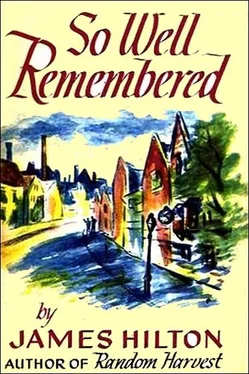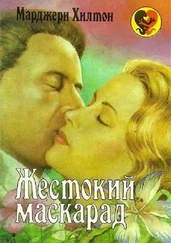Джеймс Хилтон - So Well Remembered
Здесь есть возможность читать онлайн «Джеймс Хилтон - So Well Remembered» весь текст электронной книги совершенно бесплатно (целиком полную версию без сокращений). В некоторых случаях можно слушать аудио, скачать через торрент в формате fb2 и присутствует краткое содержание. Год выпуска: 1945, Жанр: Проза, на английском языке. Описание произведения, (предисловие) а так же отзывы посетителей доступны на портале библиотеки ЛибКат.
- Название:So Well Remembered
- Автор:
- Жанр:
- Год:1945
- ISBN:нет данных
- Рейтинг книги:5 / 5. Голосов: 1
-
Избранное:Добавить в избранное
- Отзывы:
-
Ваша оценка:
- 100
- 1
- 2
- 3
- 4
- 5
So Well Remembered: краткое содержание, описание и аннотация
Предлагаем к чтению аннотацию, описание, краткое содержание или предисловие (зависит от того, что написал сам автор книги «So Well Remembered»). Если вы не нашли необходимую информацию о книге — напишите в комментариях, мы постараемся отыскать её.
So Well Remembered — читать онлайн бесплатно полную книгу (весь текст) целиком
Ниже представлен текст книги, разбитый по страницам. Система сохранения места последней прочитанной страницы, позволяет с удобством читать онлайн бесплатно книгу «So Well Remembered», без необходимости каждый раз заново искать на чём Вы остановились. Поставьте закладку, и сможете в любой момент перейти на страницу, на которой закончили чтение.
Интервал:
Закладка:
He stood in the kitchen doorway wondering how to make it sound not too dramatic, yet not so commonplace that she would miss the full significance. He began: “By the way, I’ve had news of Livia.” (He always called her ‘Livia’ to Annie.)
“You have?… Well, that’s nice. Did she say when she was coming home?”
That was a good opening. “I’m—er—afraid she’s— she’s NOT coming home.”
“WHAT?” Annie swung round in consternation as she interpreted the remark in the only way that occurred to her. “Oh, my goodness, she’s not— she’s not—you don’t mean—” And then a flood of tears.
It was quite a minute before George realized what was in Annie’s mind. Then he had to comfort her and meanwhile explain matters more specifically. “Good heavens, no—she’s all right—she’s quite well— nothing at all’s happened to her. She’s just not coming home… She’s decided to—to leave me. It does happen sometimes—that people don’t hit it off altogether… I just wanted you to know, so that you can get her clothes in order—I expect she’ll be sending for them soon. No need to talk about it in the town yet, though of course people will have to know sooner or later.” (And no need, yet, to tell even Annie the other details.)
Annie, having been heart-broken, now became furious. She belonged to a world in which women do not leave their husbands, but regard themselves as lucky to get and keep any man who does not drink, gamble, or beat them. And George not only possessed these negative virtues, but others to which Annie had for years accorded increasing admiration. She really believed him to be a great man, and for a wife to be dissatisfied with such a paragon seemed to her incomprehensible as well as shocking. She had never liked Livia as much as George, and that made her now feel that she had never liked Livia at all. “She’s a bad lot,” she whimpered scornfully. “And it’s all you could expect from where she comes from.”
“Nay… nay…” said George pacifyingly. “She’s all right, in her own way. And maybe I’m all right in mine.”
“I never really took to her,” Annie continued. “And I’m not the only one… There was something queer about her, or folks wouldn’t have talked the way they did about her father’s death and what she had to do with it— because there’s never no smoke without fire—”
“Oh yes, there is, often enough,” George interrupted sharply.
“Well, anyhow, there was something queer about Stoneclough altogether —what with ghosts and drownings and everything—and I’m sorry if I’ve let out something I wasn’t supposed to…”
She was on the point of weeping again, so George made haste to reassure her. “Oh, that’s all right, Annie. I don’t think you could tell me much that I didn’t hear at the time. But it was all gossip—not worth repeating now or even remembering—that’s the way I look at it. I doubt if we’ll ever know the whole truth about what really happened.” He found something he could force a smile at. “And as for the ghosts—why, that’s only an old yarn—a sort of local legend… I heard it long before Livia was born…”
Part Two
Livia had first heard it from Sarah (combined cook, nurse, and housekeeper to the Channing family for half a century); it was the story of three girls who had lived about a hundred years ago in the cottages in the clough. They had been little girls, not more than nine or ten, and in those days children of that age went to work at the Channing Mill (the original one that straddles the stream where the water-wheel used to be); and what was more, they had to get up in the dark of early morning to be at their machines by half-past five. Because they were always so sleepy at that hour the three had an arrangement among themselves that while they hurried from their homes they should link arms together, so that only the middle girl need keep awake; the two others could then run with eyes closed, half sleeping for those few extra minutes. They took it in turns, of course, to be the unlucky one. But one winter’s morning the middle girl was so sleepy herself that she couldn’t help closing her eyes too, with the result that all ran over the edge of the path into the river and were drowned. And so (according to legend—the story itself might well have been true) the ghosts of the three are sometimes to be seen after dark in the clough, scampering with linked arms along the path towards the old mill.
Sarah told this to Livia by way of warning to the child never to stray out of the garden into the clough, for it was always dark there under the trees, and also, added Sarah, improving the legend to suit the occasion, the ghosts were really liable to be seen at any time of the day or night. But that made Livia all the more eager to stray. She was an only child, without playmates, and it would surely be breathlessly exciting to meet three possible playmates all at once, even if they were only ghosts. She was not afraid of ghosts. In fact she was not then, or ever, afraid of anything, but she had a precocious aversion to being bored, and it WAS boring to sit in the Stoneclough drawing-room with her nose pressed to the window-pane, staring beyond the shrubs of the garden to that downward distance whence she believed her father, in some mysterious way, would return, since that was the way Sarah said he had gone.
One grey October afternoon she managed to elude Sarah and escape from the house. There was a wet mist over the moorland; the shrubs of the garden dripped noisily as she ran among them and through the gate into the forbidden clough. She ran on, under the drenched trees, keeping watch for the ghosts, and presently the moisture that had been mist higher up turned to heavy rain; then she grew tired and cold, and—though still not in the least afraid—considerably disheartened by not meeting anyone. At last she came to the road to Browdley, though she did not recognize it, never having been walked so far by Sarah or her mother; but as she stared round, a horse and carriage came along which she did recognize. The horse was William, and Watson was driving, and inside the carriage, calling to her from the window, was her mother.
So she was promptly rescued and made to sit on the familiar black cushions through which the ends of hairs stuck out and pricked her legs. It was an unfortunate encounter, for it doubtless meant that her mother would tell Sarah and Sarah would be cross (which Livia did not fear, but it was tiresome to anticipate), and worst of all, she would be watched henceforward more carefully than ever. So she made a quick and, for a child, a rather remarkable decision; she would say she had met the three little girls— the ghostly ones—in the clough, and had run after them because they beckoned her. That could serve, at worst, as an excuse; at best, it might completely divert attention from her own misdeed. Yet as she began, a moment later, she was curiously aware that her mother was showing little interest in the story; nor did she seem angry, or startled, or impressed, or any of the other things that Livia, aged four, had ideas but no words for. Her mother merely said: “Livia, you’re wet through—you must have a bath and change all your clothes as soon as you get home.”
Nor later on was there any crossness even from Sarah, but instead a strange unhappy vagueness, as if she were thinking of something else all the time. When Livia retold her yarn, Sarah answered disappointingly: “It’s only a story, Livia, you mustn’t really believe it. There aren’t any such things as ghosts.”
“Isn’t there the Holy Ghost?” Livia asked, remembering religious instruction imparted by Miss Fortescue, who came to the house every week-day morning, and seemed already to Livia the repository of everything knowable that one did not particularly want to know.
Читать дальшеИнтервал:
Закладка:
Похожие книги на «So Well Remembered»
Представляем Вашему вниманию похожие книги на «So Well Remembered» списком для выбора. Мы отобрали схожую по названию и смыслу литературу в надежде предоставить читателям больше вариантов отыскать новые, интересные, ещё непрочитанные произведения.
Обсуждение, отзывы о книге «So Well Remembered» и просто собственные мнения читателей. Оставьте ваши комментарии, напишите, что Вы думаете о произведении, его смысле или главных героях. Укажите что конкретно понравилось, а что нет, и почему Вы так считаете.










